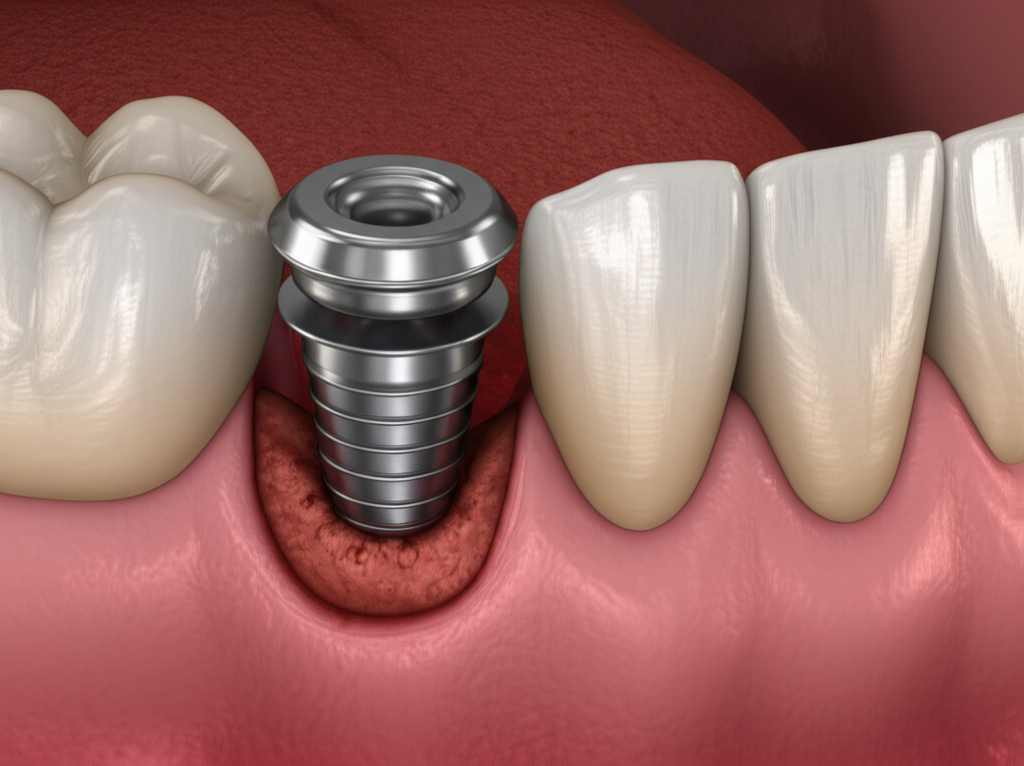
How Dental Implants Fail: A Simple Guide to Causes, Symptoms, and Prevention
Have you ever thought, “Could my dental implant fail?” Or maybe you’ve just gotten one, and now you’re worried about a strange ache or want to make sure it lasts. You are not alone. Whether you’re learning before surgery, having new problems, or just want to keep your new tooth safe, this guide is here for you. We’ll talk about what could go wrong, why it happens, and—most importantly—how you can keep your dental implants working well for many years.
What We’ll Cover
- Understanding Dental Implant Failure: Early vs. Late
- Main Reasons Dental Implants Fail
- Signs Your Dental Implant Might Be Failing
- Big Risk Factors for Implant Failure
- How to Stop Dental Implant Failure
- What Happens if a Dental Implant Fails? What You Can Do
- Who Should Get Dental Implants?
- Key Things to Remember
Worrying About Implant Failure Is Normal
Let’s be honest—nobody wants dental surgery to go wrong. But with dental implants, it’s common to have questions. You might be thinking: “Are dental implants really successful? Why do some fail?” Maybe you already feel something isn’t right and want to know if it’s just healing pain or a real problem.
Don’t worry, asking is the first step to taking care of your smile. Let’s get into it—I’ll keep things easy and clear so you know what’s going on.
Understanding Dental Implant Failure: Early vs. Late
Dental implants have really changed how we replace lost teeth. They’re like new tooth roots, made of strong materials like titanium. These need to join with your jawbone—a process called osseointegration. When it works, you have a solid base for crowns or fake teeth.
But just like a new plant, sometimes it doesn’t grow right. Knowing when things go wrong helps you notice problems early.
Early Failure: When Things Don’t Get Started
Early dental implant failure means your implant hasn’t joined to your bone yet. This usually happens in the first few weeks or months.
Why Does This Happen?
- Osseointegration Failure: The bone and implant never stick together.
- Weak bone: Soft or thin bone can’t hold the implant.
- Infection: Germs can get in during or after surgery.
- Surgical damage: Too much heat or rough work can hurt bone.
- Health problems: Like untreated diabetes, which slows healing.
- Too much pressure too soon: Chewing on the implant before it’s ready.
Late Failure: Problems After Things Seemed Fine
Late failure happens months or years after your implant felt strong.
Main Causes:
- Peri-implantitis: Gum infection around the implant causing bone loss.
- Too much bite force: Grinding or heavy chewing strains the implant.
- Bad cleaning habits: More germs and infection risk.
- Smoking: Makes mouth healing much slower.
- Health issues: Like diabetes or bone diseases.
- Parts breaking: The implant, screw, or crown can break under stress.
Good news: Most implants succeed. About 90-98% last for many years. But knowing the risks lets you act fast if something changes.
Main Reasons Dental Implants Fail
Let’s talk about how and why dental implants can fail.
1. Osseointegration Failure (Bone and Implant Don’t Join)
Think of osseointegration as strong glue holding the implant in place. If bone doesn’t stick, the implant is wobbly. This can happen if the bone is weak, gets hurt during surgery, or gets infected.
Risky Situations:
- Low bone strength or too little bone
- Overheating when drilling
- Infection near the implant early on
- Using the implant for chewing before it’s healed
2. Peri-implantitis (Gum Infection Around Implant)
Peri-implantitis is like gum disease for implants. Plaque and germs make gums and bone around the implant sore and weak.
Who Gets This:
- People who brush and floss poorly
- Smokers
- Anyone with a history of gum disease
3. Parts Breaking
Like a car, implants have parts that can wear out or break.
- Implant breaking: Not common, but possible under a lot of force.
- Loose parts: Screws or the crown on the implant can come loose.
- Badly made crowns/bridges: Can cause overload.
- Grinding teeth: Extra stress on the parts.
4. Nerve or Tissue Damage
Rarely, nerves get touched during surgery—especially in the lower jaw. This can cause tingling, numbness, or sudden pain. In the upper jaw, the implant can poke a sinus and cause nasal trouble.
5. Health Problems
Your overall health matters a lot. Some diseases and medicines can make healing hard.
- Uncontrolled diabetes: Slows healing.
- Immune diseases: May stop the body from accepting the implant.
- Weak bones: Like with osteoporosis.
- Certain drugs: Such as those for bone loss.
- Radiation: Radiation treatments to the jaw area lower blood flow and healing.
Signs Your Dental Implant Might Be Failing
Months or years after surgery, what signals trouble with your dental implant?
Watch for These Symptoms
- Pain or discomfort: If it won’t go away or gets worse.
- Red or swollen gums: Gums that puff up or look red near the implant.
- Pus or discharge: Yellow or white pus means infection.
- Loose implant: A dental implant should never wiggle.
- Gums pulling back: Seeing metal or threads is not a good sign.
- Hard to chew: Pain or wobbling while eating.
- Bad taste or breath: Lasting bad smell or taste that doesn’t stop.
Don’t wait: If you see these issues, call your dentist as soon as you can.
Big Risk Factors for Implant Failure
Why do some people have no trouble, but others do? Here are the main reasons:
- Smoking: Makes healing slower and raises infection risk.
- Bad oral hygiene: Letting bacteria build up is bad for any dental work.
- Untreated gum disease: Old gum problems often come back.
- Diabetes: High blood sugar slows down healing.
- Teeth grinding: Adds lots of pressure.
- Weak bone: Not enough bone to hold the implant.
- Inexperienced dentist: The person putting in your implant matters.
- Health issues and medicines: Some health conditions change bone healing.
- Heavy drinking: Alcohol slows healing and dries your mouth.
Smoking is one of the biggest risks—it can actually double or triple implant failure chances. That’s a great reason to quit!
How to Stop Dental Implant Failure
Here’s the best part: You can control most risks, and help your implant last a long time!
Pick a Skilled Dentist
Choose a periodontist, prosthodontist, or oral surgeon who has done lots of implants. They will check your bone, pick the right implant, and use the best surgery methods.
Brush and Floss Well
- Brush twice a day (soft brush is best)
- Floss every day—make sure to get around the implant
- Small brushes can help in tight spots
Implants can’t get cavities but still need good cleaning to avoid infection.
Go to the Dentist for Check-Ups
Regular dentist visits matter. They do cleanings and check if your implant is still healthy and tight.
Stop Smoking
Quitting—even after your implant goes in—can really help. Ask your dentist for advice or support.
Manage Health Issues
Work with your doctor to keep things like diabetes managed. Being as healthy as possible helps your mouth heal.
Protect From Grinding
If you grind your teeth at night, ask your dentist about a nighttime mouthguard.
Follow Aftercare Instructions
Don’t skip simple things, like eating soft foods or not touching the area until it’s healed.
Talk to Your Dentist About Any Worry
If something doesn’t feel right, don’t try to wait it out. Tell your dentist quickly—fast help can save your implant.
What Happens if a Dental Implant Fails? What You Can Do
Sometimes implants fail even when you do everything right. But don’t freak out—there are still options.
Find Out What’s Wrong
Your dentist will:
- Ask about your health and symptoms
- Take X-rays, maybe a CT scan
- Check for loose implants or gum problems
Early, Simple Fixes
Caught early, some problems get better with:
- Deep cleaning around the implant
- Special mouth rinses
- Antibiotics for infection
- Taking out leftover dental cement
Surgery
For bigger issues, your dentist might need to:
- Clean the area by making a small cut
- Add bone with a bone graft
- Add new gum with a gum graft
Removing the Implant
If the implant is very loose, broken, or badly infected, sometimes it must be taken out. Don’t worry—after you heal, you might be able to try again, especially if you get a bone graft.
Other Options if You Can’t Get Another Implant
Not everyone can get another implant in the same spot. Some choices are:
- Dental Bridges: Use other teeth to hold a fake one.
- Removable Dentures: Useful if you lost many teeth or have lots of bone gone.
- Partial Dentures: A temporary fix while healing.
Getting New Restorations Made Right
If you need a new crown, bridge, or denture after implant trouble, working with a good dental lab helps it look and feel like real teeth again.
How Often Do Dental Implants Fail? (Let’s Talk Numbers)
Looking at real numbers makes things clearer. Here’s a quick chart to help you understand:
| Problem/Factor | How Often It Happens |
|---|---|
| Lasts 10-20+ years (success) | 90-98% of the time |
| Overall Failure | 2-10% |
| Early Failure | 1-3% |
| Late Failure | 2-7% over many years |
| Peri-implantitis | 10-20% may get this |
| Smoking | 2-3x higher failure rate |
| Diabetes | Up to 10-15% |
| Low Bone | Up to 10% early problems |
Based on info from many dental studies and reviews. Everyone’s different.
Bottom line: Most dental implants work well. But if you know the risks, you can do more to protect them.
Who Should Get Dental Implants?
Wondering if implants fit your needs? Here’s a quick checklist.
Best if you:
- Have healthy gums and no current infections
- Have strong bone (or are okay with a bone graft if needed)
- Don’t smoke, or want to quit
- Control health problems like diabetes
- Brush and floss well
Not a good fit if you:
- Lost too much bone to fix
- Can’t clean your teeth or gums well, maybe from health issues
- Heal poorly or had radiation in your jaw
- Take certain medicines (always check with your doctor/dentist)
- Grind your teeth hard and aren’t going to wear a nightguard
Every person is different, so talk to your own dentist before deciding.
Key Things to Remember: Take Care of Your Implants
Here’s what matters most:
Simple Facts:
- Dental implants are safe, work well, and usually last decades.
- Failure is rare—usually because of gum infection, weak bone, or too much bite force.
- People who smoke, have gum or health problems, or don’t clean their teeth are at higher risk.
- Know the warning signs: pain, swelling, looseness, or lasting bad breath.
What To Do:
- Pick a skilled dentist or specialist.
- Keep your mouth clean, and see the dentist regularly.
- Quit smoking, control illnesses, and wear a nightguard if needed.
- If something seems wrong, act fast and go to your dentist.
If trouble happens:
- There are lots of ways to fix or replace implants, like grafts, removing the implant, or trying a bridge or denture.
- New dental tech means more safe and good-looking options every year.
Ready for the Next Step?
Dental implants can give new life to your smile. Most of the time they work great, and even if problems pop up, dentists have lots of ways to help. If you ever have a question or worry, ask your dentist. They’re ready to help you every step of the way.
Want to learn more about teeth health? Check out our guides on teeth health and teeth information for simple tips and tricks to keep your smile strong.
You’ve got questions—we have answers. Take care of your dental implants, and you’ll be smiling for many years to come!








